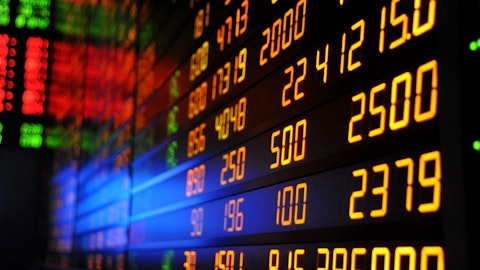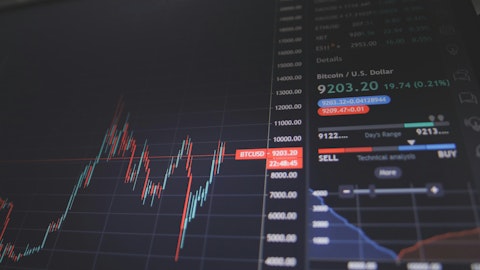2. Tesla Inc (NASDAQ:TSLA)
Number of Hedge Fund Investors: 85
Jim Cramer was recently asked about the space infrastructure solutions company Redwire. He instead recommended Tesla as a better buy in this sector for those who want to invest in the industry.
“Everybody wants to be in the space business, but I’ve got to tell you, I don’t. If you want to be in auxiliary space, go with Tesla Inc (NASDAQ:TSLA). He (Elon Musk) owns the market, and I don’t want to go against him.”
There is a lot of hype around Tesla robo taxis but many believe they will not be enough to fix the company’s long-term challenges.
What are these challenges?
Tesla Inc (NASDAQ:TSLA) product lineup is showing signs of stagnation, with over 95% of sales still coming from the Model 3 and Model Y. Meanwhile, competitors are rolling out more advanced models. Even Rivian’s CEO suggested Tesla could be nearing market saturation for these models. According to Reuters, Tesla’s market share in Europe is slipping as legacy automakers like BMW post stronger sales. Chinese competitor BYD is also gaining ground in Europe, despite talk of tariffs.
For Q2 2024, Tesla Inc (NASDAQ:TSLA) saw a 20% year-over-year decline in revenue from China, while BYD reported over 20% growth in the same period. This trend may continue as Chinese automakers release new models, and Tesla could be forced to cut prices to maintain delivery volumes—further pressuring its operating margins in the coming quarters.
Tesla Inc (NASDAQ:TSLA) is overvalued. The company’s consensus earnings-per-share (EPS) estimate for fiscal year ending December 2026 is $4.27, putting its forward price-to-earnings (PE) ratio at 60.2. With Tesla offering price cuts, future EPS growth may fall short of expectations. Investors might consider selling now and waiting for a better re-entry point, or exploring other electric vehicle (EV) options.
ClearBridge Small Cap Value Strategy stated the following regarding Tesla, Inc. (NASDAQ:TSLA) in its Q2 2024 investor letter:
“The strength in the stock market adds significantly to that enormous transfer of wealth, which one could argue is good for shareholders. But is it causal? That is, did the stock market do well because CEOs got large stock grants? Are the CEOs just the lucky recipients of a windfall when the market goes up and their employees perform well? Or do they require huge grants to do their jobs that no one else could possibly do as effectively?
Tesla, Inc. (NASDAQ:TSLA), and most of its shareholders, certainly think the latter is true. In 2018, Tesla’s board of directors crafted a pay package for CEO Elon Musk that would award him 12 tranches of 10-year, fixed-price options on 1% of company stock for every $50 billion in market cap the stock added. In total, the options would be for 304 million shares of the company at $23.34 a share. He would receive no other compensation, until or unless the board decided otherwise. Shareholders approved that pay package, and the stock added all that market cap and more, giving Musk the right to buy 10% of the company for $50 billion less than it was worth, adding to his existing 13% stake. Minority shareholders sued, and a court sided with them and expunged the package in January 2024. “The process leading to the approval of Musk’s compensation plan was deeply flawed,” ruled Judge Kathaleen McCormik of the Delaware Court of Chancery as part of a 200-page decision. It seemed like a long-awaited check on excessive compensation to one individual for the achievements of an entire company….” (Click here to read the full article)





